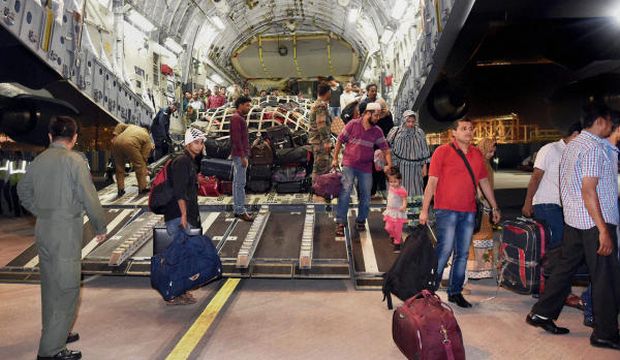
Indians evacuated from Yemen alight from the Indian Air Force C17 Globemaster aircraft after their arrival at Chhatrapati Shivaji International Airport in Mumbai, India, on April 2, 2015. (AP Photo/Press Trust of India, Mitesh Bhuvad)
Dammam, Asharq Al-Awsat—Humanitarian efforts by Saudi Arabia and its allies in the military operation against the Houthi movement in Yemen have been ongoing since the first day of the conflict, sources told Asharq Al-Awsat on Saturday.
Military and strategic expert Dr. Anwar Al-Ishqi said the Kingdom and other members of Operation Decisive Storm had coordinated the evacuation of foreign civilians and diplomats from Yemen since March 25 when the conflict began. He said they had also airdropped humanitarian aid, including food and medical supplies, to civilians as part of the campaign.
Ishqi, as well as Saudi Shura Council member Dr. Zuhair Al-Harithi, both told Asharq Al-Awsat these humanitarian efforts were an intrinsic part of the operation alongside the ongoing military efforts.
Both Russia and the International Committee of the Red Cross have called for a 24-hour ceasefire in order for humanitarian aid to reach those most in need in the country, but the Kingdom and its allies maintain that such operations have been ongoing since the start of the conflict.
In his daily briefing to reporters in Riyadh on Saturday, Saudi Defense Ministry spokesman Maj. Gen. Ahmed Asiri said a ceasefire could still be worked out by the political leadership of the coalition, though he also reiterated the coalition’s efforts to safeguard civilian lives and airdrop humanitarian aid since the start of operations.
Harithi was critical of the Moscow’s calls, saying they were “disingenuous.”
“Russia knows full well that coalition members are fully committed to [humanitarian efforts], and this [call] is but a cheap shot aimed at fulfilling an extremist agenda,” he said.
Asiri on Saturday said that coalition members Jordan and Egypt had used their own aircraft to evacuate Russian civilians from Yemen on Wednesday.
Meanwhile, Ishqi said the Kingdom wanted to show the Yemeni people its war was not against them but against the Iran-backed Shi’ite Houthi movement—which staged a coup in the country in early February—and forces from the country’s military establishment loyal to ousted former president Ali Abdullah Saleh.
Saleh and his aides had initially backed the Houthi coup, helping create a security vacuum in the country which the movement’s militias were able to expose to spread throughout Yemen.
However, a rift has recently formed between Saleh and the Houthis, and fierce fighting between his supporters and the movement’s militias have broken out in the southern port city of Aden.
Coalition forces had helped evacuate media professionals from a satellite television channel headquartered in the city after the fighting broke out, the sources said.
They added that during the early days of the operation, coalition warships—which have formed a sea blockade of the port of Aden and all other ports in the country—had also been used to help diplomats escape from the city. Many embassies had relocated to the southern port city after internationally recognized Yemeni president Abd Rabbuh Mansur Hadi escaped there in February following a Houthi-imposed house arrest in Sana’a.
Hadi, who is now in Saudi Arabia, had been seeking to form a rival power base from Aden with Gulf and international backing, in order to counter the Houthi takeover of the country.
The Saudi-led coalition, which also includes forces from Egypt, Jordan, the UAE, and Qatar, began operations in the country after a direct request from Hadi, in line with Article 51 of the UN Charter, which allows for outside military intervention in a member country if this is requested.
Ishqi maintained this was the only reason military operations in Yemen had been launched and that the offensive is being coordinated in line with all internationally recognized treaties and conventions.
He mentioned the formation of the coalition’s humanitarian and emergency committee, which coordinates the evacuation of civilians, the delivery of humanitarian aid to those most affected by the conflict, and coordinates with international relief agencies and NGOs.
This conduct was completely the opposite of that of the Houthis, Ishqi said, making reference to an attack last week on a dairy factory in the western Al-Hudaydah province in Yemen, which killed 25 workers.
The Houthis had accused coalition airstrikes of targeting the factory, but eyewitnesses speaking to Asharq Al-Awsat and later reports confirmed it had been hit by a rocket from a nearby army base controlled by forces loyal to the movement.
Ishqi said this was part of a ploy by the Houthis to drum up international opposition to the current military efforts by claiming that the airstrikes were targeting civilians. Saudi Defense Ministry spokesman Asiri said last week that the Houthis were deliberately locating their military supplies and forces in civilian areas.
Coalition forces have maintained they are taking extra care in line with international law to make sure all targets are clear of civilians. Asiri told reporters on Saturday that airstrikes on Aden scheduled for Friday had been delayed precisely for this reason.
Meanwhile, Ishqi said some international relief organizations were concerned about the safety of their aid workers in the country, fearing they could be targeted by Houthi militias.
“I recently received a phonecall from the Médecins Sans Frontières [Doctors Without Borders] NGO who are seeking to find a way to get in contact with the Houthis in order to receive guarantees that their aid workers, who are in Yemen to help the people, will be safe in the country,” he said.
The Kingdom and its allies were keen not only to show the Yemeni people that they are on their side, but also to show the entire international community that they were pursuing this current military operation in line with Islamic principles regarding the conduct of war, Ishqi said.
Such principles call for the protection of civilians and offering help and humanitarian aid to those in need as a result of any military offensive, he added.
